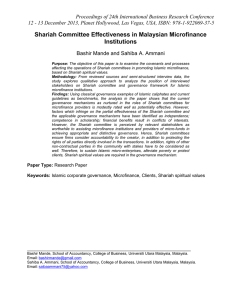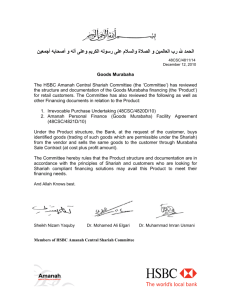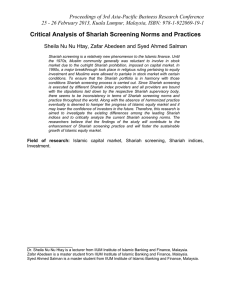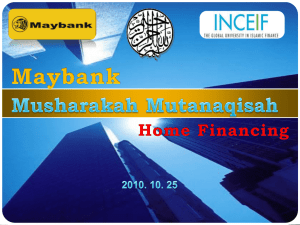Page 1
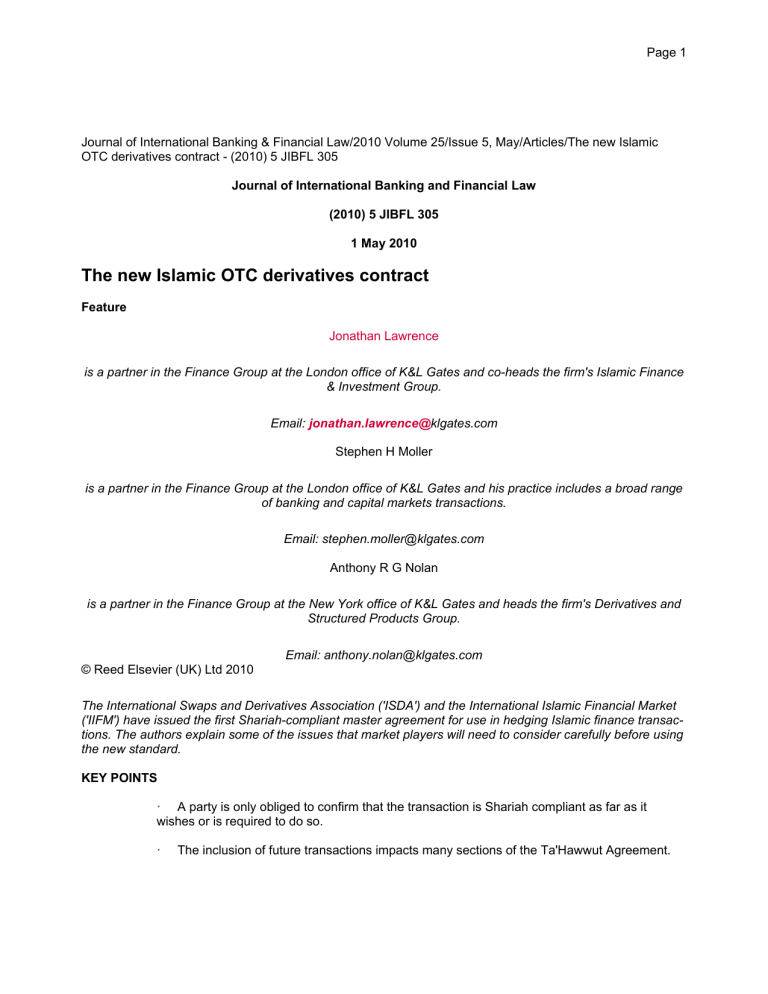
Page 1
Journal of International Banking & Financial Law/2010 Volume 25/Issue 5, May/Articles/The new Islamic
OTC derivatives contract - (2010) 5 JIBFL 305
Journal of International Banking and Financial Law
(2010) 5 JIBFL 305
1 May 2010
The new Islamic OTC derivatives contract
Feature
Jonathan Lawrence is a partner in the Finance Group at the London office of K&L Gates and co-heads the firm's Islamic Finance
& Investment Group.
Email: jonathan.lawrence@ klgates.com
Stephen H Moller is a partner in the Finance Group at the London office of K&L Gates and his practice includes a broad range of banking and capital markets transactions.
Email: stephen.moller@klgates.com
Anthony R G Nolan is a partner in the Finance Group at the New York office of K&L Gates and heads the firm's Derivatives and
Structured Products Group.
Email: anthony.nolan@klgates.com
© Reed Elsevier (UK) Ltd 2010
The International Swaps and Derivatives Association ('ISDA') and the International Islamic Financial Market
('IIFM') have issued the first Shariah-compliant master agreement for use in hedging Islamic finance transactions. The authors explain some of the issues that market players will need to consider carefully before using the new standard.
KEY POINTS
· A party is only obliged to confirm that the transaction is Shariah compliant as far as it wishes or is required to do so.
· The inclusion of future transactions impacts many sections of the Ta'Hawwut Agreement.
Page 2
· There is no single net sum payable under the Ta'Hawwut Agreement if it covers both fully delivered transactions and undertakings for future agreements or transactions under which delivery remains to be performed.
· The definition of close-out amount is dealt with briefly and changes make this area very subjective.
On 1 March 2010 ISDA and IIFM jointly issued the first Shariah-compliant master agreement for over-thecounter ('OTC') derivatives. Styled the 'ISDA/IIFM Ta'Hawwut Master Agreement', the master agreement (the
'Form') provides a framework for the expansion of derivatives activity in the Middle East, South Asia and many regions throughout the world where hedging is not currently standard practice due to ethical concerns.
While based on the 2002 ISDA Master Agreement (the '2002 Master Agreement') and with many terms familiar to participants in swap markets, the Form has been developed under the guidance and approval of the
IIFM Shariah Advisory Panel. The Form is therefore expected to be used as a reference for market participants where they or their customers need to hedge risks in line with Shariah principles.
PERTINENT ISLAMIC CONCEPTS
With the Form, ISDA and IIFM have sought to provide a basis to hedge risks that are common in Shariahcompliant transactions in a Shariah-compliant way. There is a high correlation between Shariah-compliant investing and socially responsible investing. Shariah investment is constrained by restrictions on the way in which transactions can be carried out and the purposes for which they are entered into. In particular,
Shariah-compliant financial transactions may not involve:
· 'riba' (the charging of interest). Riba is strictly prohibited in Islamic finance and investment transactions. Any agreement that includes riba is invalid from the Shariah viewpoint, irrespective of the parties agreeing to such a contract;
· 'gharar' (unavoidable uncertainty). This principle means the avoidance of any element of uncertainty in a contract that is otherwise preventable or avoidable; or
· 'maysir' (gambling or speculation). This affects the purpose of 'ta'hawwut' or hedging transactions to the extent that the hedge must be strictly linked to underlying transactions and cannot have the sole purpose of making money from money.
Although they may make a Shariah-compliant derivative seem like a contradiction in terms, OTC derivative transactions are not necessarily repugnant to Islamic finance principles if carefully drafted and appropriately limited in purpose. Islamic finance, just like conventional finance, has a need for hedging against unexpected changes in exchange rates and commodity prices. Surprisingly, hedges are also needed in some transactions against changes in interest rates, despite the prohibition on interest in Islamic finance, because
Shariah-compliant transactions often use published interest rates as a benchmark for pricing Islamic financial products.
EFFECT OF ABSENCE OF INTEREST
As expected, the Form rigorously eliminates provisions for payment of interest. However, it is not clear how the time value of money is addressed in situations contemplated by the Form where amounts may be deferred. Deferral of payments may occur in two circumstances. First, there is normal delay in obtaining payment of termination amounts and unpaid amounts as well as deferrals during the waiting period for force majeure. Secondly, delay occasioned by deferral of performance of future agreements is contemplated in, for example, the set-off provision. In the second case, the parties can structure the payment price or delivery amount, but it seems that in the first case the payee may lose the value of use of the money during the period it is tied up.
Page 3
The absence of interest may also affect the behaviour of parties in a default situation. A defaulting party may potentially raise legal objections and elongate the process knowing that default interest is no disincentive.
Equally, a non-defaulting party may prefer to continue with a transaction under a mechanism that has a premium attached rather than be left with a liquidated amount which carries no interest.
These issues related to the removal of interest will need further examination by parties and in-house counsel to determine whether the economics of a transaction will be distorted on early termination or otherwise.
IN WHICH SORTS OF TRANSACTION MAY THE FORM BE USEFUL?
The Form expressly contemplates that parties will enter into underlying Shariah-compliant transactions that may include 'murabaha' transactions. 'Murabaha' refers to a deferred payment arrangement used to provide trade or acquisition finance. In a 'murabaha' transaction, the financier buys an asset from the supplier and sells it to the customer at a premium, typically payable in instalments. The premium is generally based on a benchmark rate, such as LIBOR, plus a margin, thus giving rise to the need to hedge fluctuations in such benchmark. The financier must acquire title to the asset in question, taking some commercial risk in relation to it. When one party undertakes to enter into a transaction in the future at the election of the other party, that undertaking is a 'wa'ad.' The Form contemplates two distinct sets of 'wa'ad':
· the 'wa'ad' to enter into designated future transactions ('DFT') between the parties to the
Form; this 'wa'ad' will usually be contained in the DFT terms confirmation entered into at the time the parties agree the specific terms to apply to the DFT; and
· the 'wa'ad' to enter into 'musawama' under s 2(e) of the Form in the event of an early termination date. A 'musawama' is a sale contract in which a commodity is traded without the cost price of the object being known to the purchaser.
JURISDICTIONAL GOVERNING LAW
The Form is intended to be Shariah-compliant. However, the standard representation by each party to the
Form at s 3(h) as to Shariah compliance is caveated by the words: 'Insofar as [a party] wishes or is required for any reason to enter into transactions which are... Shariah-compliant ... it has made its own investigation into and satisfied itself as to the Shariah compliance of this Agreement (including the obtaining of a declaration, pronouncement, opinion or other attestation of the Shariah adviser, board or panel relevant to it where required).' Therefore a party is only obliged to confirm that the transaction is Shariah-compliant as far as it wishes or is required to do so. This may lead to further discussions between the parties as to each other's stance on such issues. If a non-Islamic party is concerned, then it could attempt to exclude this representation. Due to the varied interpretations of Shariah law, users may also want to involve their Shariah advisers in approving the Form.
There are disclaimers throughout the Form that there is no guarantee of Shariah compliance for any amendments or additions to the Form or related underlying transaction documents. Parties must obtain their own opinions from scholars if this is a concern. Areas where concerns could arise may include the transactions themselves that are being hedged as well as events of default under s 5(a)(v) (default under specified transaction) and 5(a)(vi) (cross-default), as those provisions, by their terms, may relate to transactions that are not Shariah-compliant.
Regardless of the Shariah compliance of the Form or any transactions thereunder, the Form provides for the election of New York law or the law of England and Wales as the governing secular law for transactions under the Form. Section 1(d) provides that any reference to 'law' or 'laws' in the Form does not include reference to principles of the Shariah. It also provides that determinations of unlawfulness or illegality are made without reference to Shariah law. This means that termination events under s 5(b)(i) (illegality) or s 5(b)(iii)(2)
(tax event -- change of tax law) will be determined without regard to Shariah law principles.
The approach of relying on the law of a country as the governing law of a contract intended to be Shariahcompliant was confirmed by the English Court of Appeal in the case of Beximco Pharmaceuticals Ltd and
Page 4 others v Shamil Bank of Bahrain EC [2004] EWCA Civ 19. The judgment prevented the parties introducing
Shariah principles to avoid a contract. However, it did place even further importance on the requirement for parties who required Shariah-compliance ensuring that the Islamic document (in this case, the Form) and related transactions be blessed by Shariah advisers to their satisfaction. The recent English High Court case of The Investment Dar Company KSCC v Blom Developments Bank SAL [2009] EWHC 3545 (Ch) concerned a Lebanese bank, Blom, providing a Kuwaiti company, TID, with funds through a 'wakala' (or agency) based deposit/investment structure. Blom demanded the return of its monies and TID argued that as the 'wakala' did not comply with Shariah, TID did not have legal capacity and the arrangements were therefore ultra vires TID. The court heard Islamic finance expert evidence on both sides but declined to consider the evidence in detail -- this issue will be considered at a later trial. When entering into the Form under English law each party needs to closely examine their capacity and authority to enter into transactions in an Islamic compliant manner or agree to expressly waive any Shariah defences, otherwise parties may argue later that the
Form is not enforceable on Shariah grounds.
MAIN DIFFERENCES BETWEEN 2002 MASTER AGREEMENT AND THE FORM
The Form is heavily based on the 2002 Master Agreement. Important provisions such as the liability for indemnified taxes, events of default, termination events, governing law, cross-transaction payment netting and setoff are similar to those in the 2002 Master Agreement, but there are differences.
Transactions and Defined Future Transactions. The Form includes not just completed transactions but also undertakings to enter into DFT. It appears that the separation of completed transactions and DFT agreements may be intended to create a mechanism to effectuate hedging, where it is helpful to separate the legs of underlying hedged transactions for purposes of Shariah compliance.
The inclusion of future transactions impacts many sections of the Form. For example, the events of default and termination events have been modified to account for non-performance of future obligations (with a shorter grace period for failure to enter into a future transaction than for other non-payment events of default) and for illegality/force majeure affecting a party's ability to enter into future transactions; and the set-off provision is modified to provide for deferral of set-off where amounts are to be paid in future under future transactions. Another example is that the right to transfer payment entitlements under s 7 is expanded to include the right to receive the purchase price under a 'musawama'. It also may affect netting, as discussed below.
Close-out Mechanism. While in many respects the early termination provisions of the Form are similar to those in s 6 of the 2002 Master Agreement, the close out settlement mechanics relating to the calculation of the settlement amount differ considerably between the two forms. The inclusion of future transactions also has significant consequences for the termination mechanism in ss 6(d) and 6(e), because, while the 2002
Master Agreement concept of a 'close out amount' is included (in simplified form) for fully delivered transactions, the termination amount of non-fully delivered transactions or DFT is valued by determination of a Relevant Index, which essentially uses a methodology that is very similar to the market quotation methodology in the 1992 ISDA Master Agreement. Consequently, there is no single net sum payable under the Form if it covers both fully delivered transactions and undertakings for future agreements or transactions under which delivery remains to be performed.
Additionally, the termination provisions require a market valuation of the Designated Assets under s 6(f)(v) as determined by the exercising party 'acting in good faith and in a commercially reasonable manner.' This adds a level of uncertainty to the mechanics.
In entering into the Form, each party issues an undertaking to enter into a contract in the future for the sale of assets following the designation of an early termination date. The party to whom the Relevant Index
Amount is due may exercise the 'wa'ad' given in its favour and sell pre-agreed assets in exchange for the cost price of such assets and the Relevant Index Amount. If, in breach of the 'wa'ad' it has issued, a party fails to purchase the assets under a 'musawama', liquidated damages are determined and payable.
Shariah Compliance Provisions. The Form includes many references that appear intended to ensure compliance with Shariah principles. These include references to Shariah law compliance, elimination of references to provisions for payment of interest (eg, elimination of 'interest and compensation' provisions of s 9(h) of the
2002 Master Agreement and replacement with 'no interest payable' as well as elimination of related defini-
Page 5 tions such as 'applicable close out rate' and 'applicable deferral rate'); change of the term 'specified indebtedness' to 'specified obligation' albeit with no change to the substance; and references in various places to confirmation that provisions that may contemplate non-Islamic financing do not necessarily mean such are authorised (eg, the footnote in the definition of 'specified obligation,' new language at the end of the definition of 'specified transactions'). References to taking into account the creditworthiness of a party in the context of obtaining quotations are also removed throughout.
POINTS TO CONSIDER
The Form raises points of ambiguity on which advice will be required:
Netting of transactions and Relevant Index Amounts under DFT: Parties may elect to have crosstransaction payment netting apply. However, netting of future transactions is not covered (except in a footnote that contemplates that parties may provide for similar netting in those agreements). There is no provision in the Form that purports to make it a cross-product master netting agreement. There may be enforceability issues in the bankruptcy of a party with respect to the netting of amounts under existing transactions versus amounts in respect of future transactions, particularly to the extent that future transactions may contemplate delivery of assets rather than payment of money. This will also be affected by whether and to what extent netting is enforceable as a matter of bankruptcy law in jurisdictions of parties to the Form. It is important that parties consider netting in the relevant jurisdictions, particularly when netting a cash claim against an obligation to deliver an asset.
Redesignation to avoid termination event: The replacement of 'transfer' with 'redesignation' in s 6(b)(ii) may create ambiguity as to whether 'redesignation of rights and obligations' implies the ability of the affected party to change substantive rights in connection with changing the obligor office.
Simplification of close-out amount: The Form replaces the definition of close out amount that appears in the 2002 Master Agreement with a very brief definition, and with many elements of the definition that relate to good faith and commercial reasonableness inserted in the operative text relating to the close out amount and the determination of the Relevant Index. The change should be studied with care, because it appears to make this area very subjective. The relation of the close-out amount calculation to the automatic acceleration of specified payments in s 6(d)(i) of the Form may also create ambiguity to the extent it may be read to imply that the specified payments are separate from the close-out amount.
Determination of close-out amount where there are two affected parties or burdened parties: Like the
2002 Master Agreement, s 6(e)(ii) of the Form provides that, in certain cases, both parties calculate a closeout amount and that the close out amount be calculated based on those calculations. Unlike in the 2002
Master Agreement, s 6(e)(ii) does not include a mechanism to split the difference between both calculations.
This is probably an oversight, because a corresponding provision in s 6(f)(iii) for determination of the Relevant Index and Relevant Index Amount relating to future transaction agreements or non-fully delivered transactions does include that language.
Removal of credit-worthiness in determining quotations: The 2002 Master Agreement generally requires that mid-market quotes and some others may take into account the credit-worthiness of the requesting party.
Not so in the Form. This could distort the economics of a transaction on early termination or otherwise.
No Shariah advisory board approval for transactions: The introductory paragraph to the Form states the limits of formal religious approval. Since s 5(a)(v) (default under specified transaction) and s 5(a)(vi) (crossdefault) may relate to transactions that are not Shariah-compliant, it may be necessary to consider carefully any issues in obtaining this approval for particular transactions. Similar issues may arise with regard to hedging activities of dealer counterparties. Would parties have to wall off their transactions from others under the
Form? Would a party's own Shariah advisers require modification of those terms?
Basis risk concerns: It may remain to be seen how the Form will coexist with other forms to the extent that counterparties may hedge exposure thereunder by entering into master agreements with differing terms. For example, the unique close-out methodology may expose counterparties to risk of loss to the extent that hedging transactions would be closed out using a different methodology.
Page 6
WHICH ISSUES REMAIN?
The Form is a step forward in demystifying the Islamic finance and investment market by using an accepted market document as the basis for a new standard. However, its use will need to be monitored and issues will arise in its application which will need to be carefully considered. The lack of such documentation to this point has been one of the impediments to the market's further development. While it raises issues that market participants will consider carefully, ISDA and IIFM are working with sovereign players in the Islamic finance market -- including the UAE and Malaysia -- to amend domestic legal frameworks governing closing out and netting. In order for the efforts in development of standard documentation for transactions in Islamic derivatives to be optimised, legal and regulatory changes are needed across Islamic jurisdictions, in particular in relation to insolvency, collateral and conflict of law issues.
